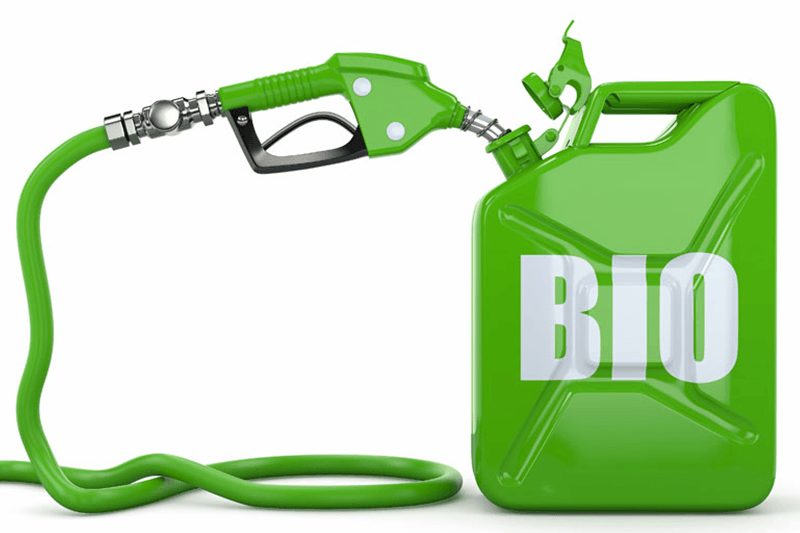
Biofuels and its fast fame
Even the carpenter gets cut sometimes. This could be subtly written about the 2003/30 / EC Directive of 2003, which targets a 10% share of biocomponents in automotive fuels in the European Union. Biofuel was obtained from oilseed rape, various grain crops, corn, sunflower and other crops. Politicians, not only from Brussels, recently declared them an ecological miracle saving the planet, and so they supported the cultivation and subsequent production of biofuels with generous subsidies. Another saying says that every stick has two ends, and a few months ago something unheard of, if predictable from the very beginning, happened. EU officials recently officially announced that they will no longer support the cultivation of crops for production, as well as the production of biofuels itself, in other words, generously subsidize.
But let's get back to the right question about how this naive, even stupid biofuel project got started. Thanks to financial support, farmers began to grow suitable crops for biofuel production, production of conventional crops for human consumption was gradually reduced, and in third world countries, further deforestation of increasingly rare forests was even accelerated in order to obtain land for growing crops. It is clear that the negative effect was not long in coming. Apart from rising prices for basic foodstuffs and, as a result, worsening hunger in the poorest countries, imports of raw materials from third countries also did not help European agriculture much. The cultivation and production of biofuels have also increased CO emissions.2 more than burning conventional fuels. In addition, nitrous oxide emissions (some sources say up to 70%), which is a much more dangerous greenhouse gas than carbon dioxide - CO.2... In other words, biofuels have done more damage to the environment than the hated fossils. We must not forget about the not very sparing effect of biofuels on the engine itself and its accessories. Fuel with a large amount of biocomponents can clog the fuel pumps, injectors, and damage the rubber parts of the engine. Methanol can gradually convert to formic acid when exposed to heat, and acetic acid can gradually convert to ethanol. Both can cause corrosion in the combustion system and in the exhaust system with prolonged use.
Several statutes
Although there has been an official announcement recently to withdraw support for growing crops for biofuel production, it does not hurt to remember how the whole situation around biofuels has evolved. It all started with Directive 2003/30/EC of 2003, the goal of which was to achieve a 10% share of bio-based automotive fuels in the countries of the European Union. This intention since 2003 was confirmed by the ministers of economy of the EU countries in March 2007. It is further complemented by Directives 2009/28EC and 2009/30 EC approved by the Council of Europe and the European Parliament in April 2010. EN 590, which is being gradually amended, is the maximum permitted volume fraction of biofuels in fuel for the final consumer. First, the EN 590 standard from 2004 regulated the maximum amount of FAME (fatty acid methyl ester, most commonly rapeseed oil methyl ester) to five percent in diesel fuel. The latest standard EN590/2009, effective November 1, 2009, allows up to seven percent. It's the same with adding bio-alcohol to gasoline. The quality of bio-ingredients is regulated by other directives, namely diesel fuel and the addition of the EN 14214-2009 standard for FAME bio-ingredients (MERO). It establishes the quality parameters of the FAME component itself, in particular parameters limiting oxidative stability (iodine value, unsaturated acid content), corrosivity (glyceride content) and nozzle clogging (free metals). Since both standards only describe the component added to the fuel and its possible amount, national governments have been forced to pass national laws requiring a country to add biofuels to motor fuels in order to comply with mandatory EU directives. Under these laws, at least two percent of FAME was added to diesel fuel from September 2007 to December 2008, at least 2009% in 4,5 years, and at least 2010% of the added biocomponent was installed at 6 years. This percentage must be met by each distributor on an average over the entire period, which means it can fluctuate over time. In other words, since the requirements of the EN590/2004 standard must not exceed five percent in a single batch, or seven percent since the entry into force of EN590/2009, the actual proportion of FAME in tanks for service stations can be in the range of 0-5 percent and currently time 0-7 percent.
A bit of technology
Nowhere in the directives or official statements it is mentioned whether there is an obligation to test driving already or simply to prepare new cars. The question logically arises that, as a rule, no directives or laws guarantee whether the blended biofuels in question will perform well and reliably in the long run. It may be that the use of biofuels can lead to the rejection of a complaint in the event of a fuel system failure in your vehicle. The risk is relatively small, but it exists, and since it is not regulated by any legislation, it was actually passed on to you as a user without your request. In addition to the failure of the fuel system or the engine itself, the user must also consider the risk of limited storage. Biocomponents decompose much faster, and, for example, such bio-alcohol, added to gasoline, absorbs moisture from the air and thus gradually destroys all fuel. It degrades over time because the concentration of water in the alcohol reaches a certain limit at which water is removed from the alcohol. In addition to corrosion of the fuel system components, there is also a risk of freezing of the supply line, especially if you park the car for a long time in winter weather. The biocomponent in diesel fuel oxidizes very quickly for variety, and this also applies to diesel fuel stored in large tanks, as these must be equipped with ventilation. Oxidation over time will cause the methyl ester components to gel, resulting in increased viscosity of the fuel. Commonly used vehicles, in which the refueled fuel is burned for several days or weeks, do not pose a risk of deteriorating fuel quality. Thus, the approximate shelf life is about 3 months. Therefore, if you are one of the users who store fuel for various reasons (in or out of the car), you will be forced to add an additive to your blended biofuel, to biogasoline, such as Welfobin, for biodiesel diesel. Also look out for the various suspiciously cheap pumps, as they may offer after-warranty fuel that could not be sold on time on other pumps.
Diesel
In the case of a diesel engine, the greatest concern is the life of the injection system, since the biocomponent contains metals and minerals that can clog the nozzle holes, limit their performance and reduce the quality of the fuel atomized. In addition, the contained water and a certain proportion of glycerides can corrode the metal parts of the injection system. In 2008, the Coordinating Council of Europe (CEC) introduced the F-98-08 methodology for testing diesel engines with common rail injection systems. Indeed, this methodology, which works on the principle of artificially increasing the content of undesirable substances over a relatively short test period, has shown that if effective detergents, metal deactivators and corrosion inhibitors are not added to diesel fuel, the content of biocomponents can quickly reduce the permeability of the injectors. .. become clogged and thus significantly affect the operation of the engine. Manufacturers are aware of this risk, and therefore the high quality diesel fuel sold by branded stations meets all the necessary criteria, including the content of biocomponents, and maintains the injection system in good condition for a long period of operation. In the event of refueling with unknown diesel fuel, which may be of poor quality and lack of additives, there is a risk of this blockage and, in the case of low lubricity, even entrapment of sensitive components of the injection system. It should be added that older diesel engines have an injection system that is less sensitive to the cleanliness and lubricating properties of the diesel, but they do not allow the clogging of the injectors by residual metals after esterification of vegetable oils.
Apart from the injection system, there is another risk associated with the reaction of engine oil to biofuels, as we know that a small amount of unburned fuel in each engine seeps into the oil, especially if it is equipped with a DPF filter without external additive. Fuel enters the engine oil during frequent short driving even in the cold, as well as during excessive engine wear through the piston rings and, more recently, due to the regeneration of the particulate filter. Engines that are equipped with a particulate filter without external additives (urea) must inject diesel fuel into the cylinder during the exhaust stroke to regenerate and transport it unburned to the exhaust pipe. However, under certain circumstances, this batch of diesel fuel, instead of evaporating, condenses on the cylinder walls and dilutes the engine oil. This risk is higher when using biodiesel because biocomponents have a higher distillation temperature, so their ability to condense on the cylinder walls and subsequently dilute the oil is slightly higher than when using conventional clean diesel fuel. Therefore, it is recommended to reduce the oil change interval to the usual 15 km, which is especially important for users of the so-called Long Life Modes.
Petrol
As already mentioned, the greatest risk in the case of biogasoline is the miscibility of ethanol with water. As a result, biocomponents will absorb water from the fuel system and the environment. If you park the car for a long time, for example in winter, you may have problems starting, there is also a risk of freezing of the supply line, as well as corrosion of the fuel system components.
In a few transformations
If biodiversity has not completely left you, read the next few lines, which this time will affect the economy of the work itself.
- The approximate calorific value of pure gasoline is about 42 MJ / kg.
- The approximate calorific value of ethanol is about 27 MJ / kg.
It can be seen from the values above that alcohol has a lower calorific value than gasoline, which logically implies that less chemical energy is converted into mechanical energy. Consequently, alcohol has a lower calorific value, which, however, does not affect the power or torque output of the engine. The car will follow the same path, only consuming more fuel and relatively less air than if it were running on regular pure fossil fuel. In the case of alcohol, the optimal mixing ratio with air is 1: 9, in the case of gasoline - 1: 14,7.
The latest EU regulation states that there is a 7% impurity of the biocomponent in the fuel. As already mentioned, 1 kg of gasoline has a calorific value of 42 MJ, and 1 kg of ethanol has 27 MJ. Thus, 1 kg of mixed fuel (7% biocomponent) has a final heating value of 40,95 MJ / kg (0,93 x 42 + 0,07 x 27). In terms of consumption, this means that we need to obtain an additional 1,05 MJ / kg to match the combustion of regular undiluted gasoline. In other words, consumption will increase by 2,56%.
To put that in practical terms, let's take this ride from PB to Bratislava Fabia 1,2 HTP in a 12-valve setting. Since this will be a motorway trip, the combined consumption is about 7,5 liters per 100 km. At a distance of 2 x 175 km, the total consumption will be 26,25 liters. We will set a reasonable petrol price of € 1,5, so the total cost is € 39,375 € 1,008. In this case, we will pay XNUMX euros for home bio-orthology.
Thus, the above calculations show that the actual fossil fuel savings are only 4,44% (7% - 2,56%). So we have little biofuel, but it still increases the cost of operating a vehicle.
conclusion
The aim of the article was to point out the effects of introducing a mandatory biocomponent into traditional fossil fuels. This rash initiative by some officials not only caused chaos in the cultivation and prices of staple foods, deforestation, technical problems, etc., but ultimately also led to an increase in the cost of operating the car itself. Maybe in Brussels they don't know our Slovak proverb “measure twice and cut once”.

